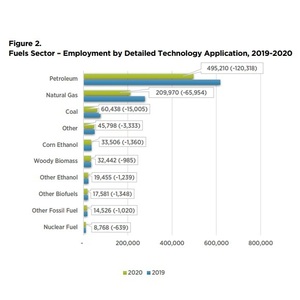DOE report predicts job growth in biofuels sector

July 22, 2021
BY Erin Krueger
The U.S. Department of Energy on July 19 released its 2021 U.S. Energy Employment Report, which shows jobs in biobased fuels fell last year, but at a lower rate than overall job losses in the U.S. fuel sector.
The U.S. fuels sector lost 211,201 jobs last year, an 18.4 percent decline. The steepest loses were in the oil and gas sectors, which lost nearly 21 percent of jobs. Jobs in biofuels, however, fell less precipitously. Corn ethanol employment declined by about 4 percent, or 1,360 jobs, while woody biomass and other biofuels declined by about 5 percent, or 3,571 jobs.
The DOE reports employment in corn ethanol was at 33,506 last year, down 1,360. Employment in wood biomass was at 32,442, down 985. Employment in “other ethanol” fell 1,239 jobs to 19,455, while jobs in other categories of biofuel fell 1,348 to 17,581.
Advertisement
Advertisement
Employers in the corn ethanol fuels industry expect 9 percent growth in 2020. Much of that growth is anticipated by employers in the manufacturing and professional services sectors who expect 11 percent and 17 percent growth, respectively.
Other ethanol and non-woody biomass fuels, including biodiesel, employed about 2 percent of the U.S. fuels workforce last year, accounting for 19,455 jobs. Unemployment was down 6 percent, or 1,239 jobs, when compared to 2019.
Other ethanol and non-woody biomass fuels employers are expecting nearly 7 percent job growth in 2020, with those hiring growth expectations concentrated in other and professional services.
Advertisement
Advertisement
Woody biomass fuel for energy and cellulosic biofuels supported 32,442 jobs in the U.S. last year, accounting for 3.5 percent of the U.S. fuels workforce, down 985 jobs from 2019.
Woody biomass fuels employers are expecting 7 percent job growth in 2021, led by professional business services. However, the largest sector, agriculture and forestry, expects a slight decline in 2021.
A full copy of the report can be downloaded from the DOE website.
Related Stories
At the University of Missouri, plant biochemist Jay Thelen is using arabidopsis as a powerful model to explore ways to boost oil production — an important step toward creating more sustainable, plant-based energy sources.
Iowa farmers have a new market opportunity for their 2025 soybean crop. Landus is expanding its Clean Fuel Regulation initiative, made possible by recent policy changes expected to increase Canada's demand for liquid biofuel.
Topsoe, a leading global provider of advanced technology and solutions for the energy transition, has been selected as the renewable diesel technology partner for CountryMark’s Mount Vernon, Indiana refinery.
The U.S. exported 35,953.6 metric tons biodiesel and biodiesel blends of B30 or greater, according to data released by the USDA Foreign Agricultural Service on Aug. 5. Biodiesel imports were at 2,148.9 metric tons for the month.
XCF Global leverages Alfa Laval technology to enhance pretreatment capabilities at New Rise Reno facility
XCF Global Inc. on Aug. 5announced it leverages Alfa Laval Inc. pretreatment technology at its New Rise Reno biorefinery, a sustainable aviation fuel (SAF) plant located in Nevada. The pretreatment technology enhances feedstock flexibility at the plant.
Upcoming Events










